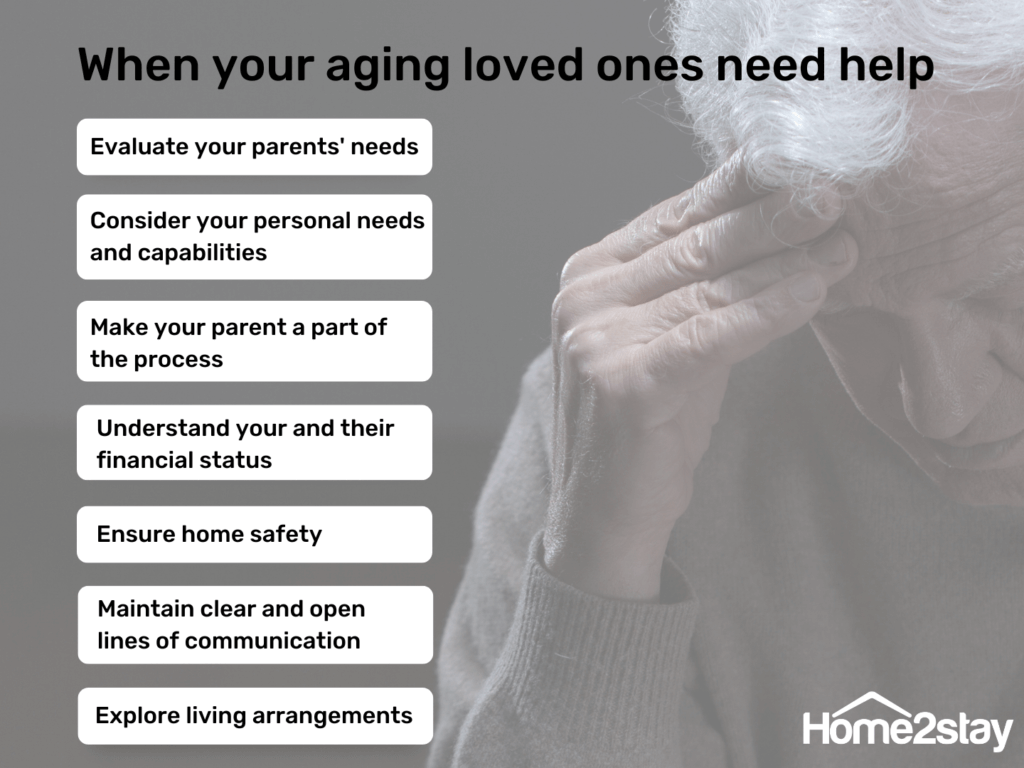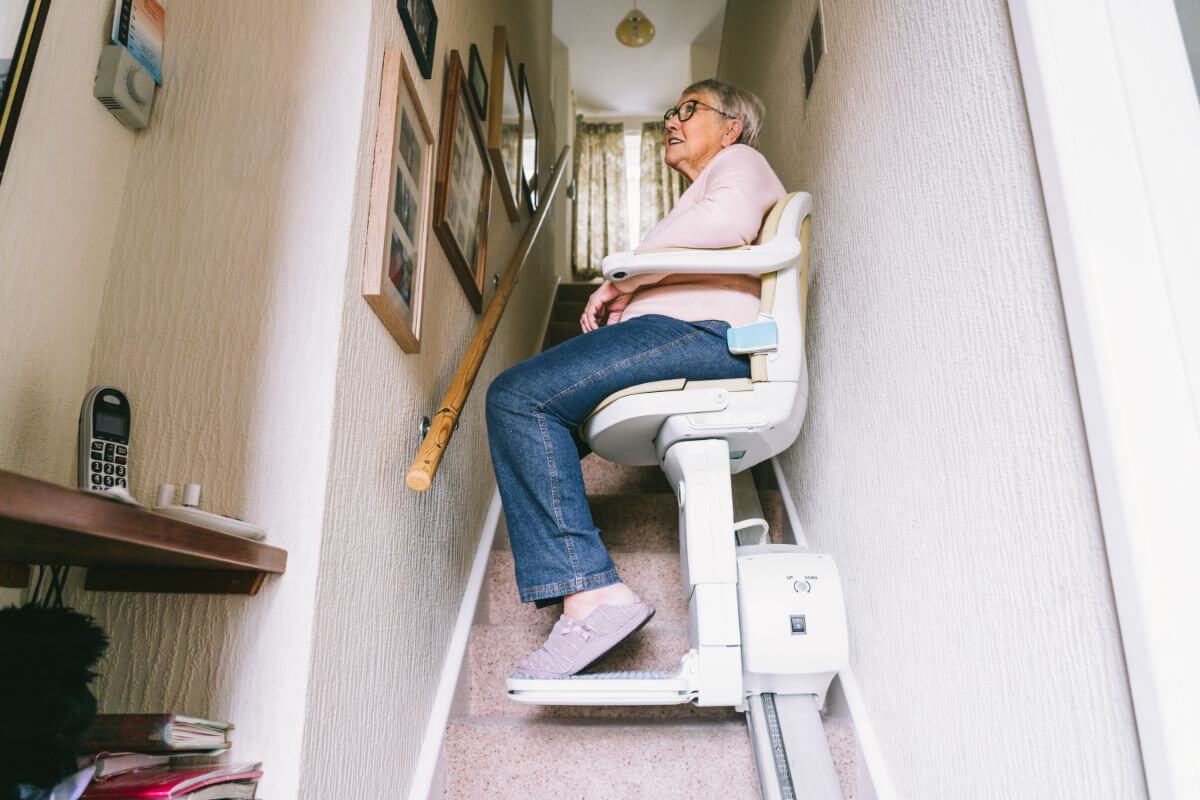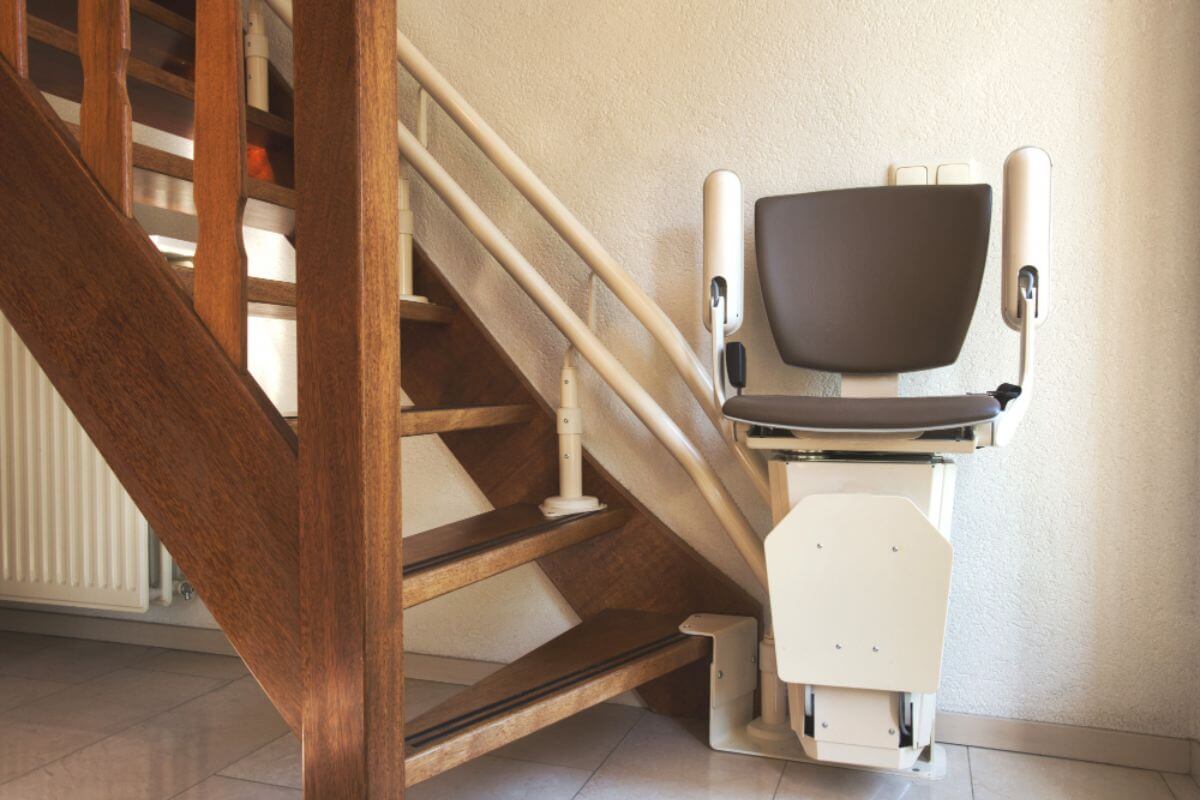A 7-Step Guide to Helping Your Elderly Parents and Loved Ones

It can be a stressful and overwhelming experience to see your loved ones lose their independence as they age due to health problems or disabilities. As a result of these factors, some older adults experience a decline in their mental and physical capacity that makes it harder for them to carry out certain everyday tasks.
We need to know what steps to take when our aging parents start needing help with daily chores and activities. Let’s look at the proper ways of helping them transition into the “happily retired” stage while keeping them grounded.
Steps to Take When Aging Loved Ones Need Help
STEP 1: Evaluate your parents’ needs
Each person’s specific needs vary and if you are unsure of precisely what has to be done, providing care for a parent can seem daunting.
The eight key areas to take into consideration are:
- Availability of assistance from able-bodied individuals
- Home safety and other safety issues
- Healthcare and medical requirements
- State of cognitive health
- Mobility
- Capacity to carry out activities of daily living (ADLs) and instrumental activities of daily living (IADLs)
- Social engagement
- Legal and financial issues
Are you available and willing to commit to helping your parents? Or do you have family members living nearby who can offer assistance to your parents? If so, ask them if they are willing to help out with home management tasks such as grocery shopping and cooking meals.
You may need to start thinking about availing of home care services for your parents- hire an in-home or stay-out caregiver who can help out with the daily tasks that need to be done. Determine your budget before getting professional help- A stay-out caregiver who only comes for several days a week could save you money compared to paying for a full-time live-in caregiver.
Are your parent’s or elderly loved one’s home equipped with the right tools and devices so they can safely and comfortably age in place?
Aside from home safety, this factor also includes assessing the financial vulnerability (or possible exploitation), home security, transportation concerns, etc. of your aging parent.
There are different ways you can help your parent with these needs, but we recommend starting with the most basic: provide them with the health insurance that they need.
Canada does have a universal health care system, where every citizen or permanent resident can apply for public health insurance. Each province and territory has a unique health plan that offers a range of products and services. Make sure you are aware of what your plan covers because there are some significant distinctions between each plan.
You may also want to get an elder care attorney to help guide you through the complex process of getting your parents the help they need.
It is important to look at not only the physical health of your aging parents but also their cognitive and mental health. Even if they are physically healthy but their cognitive state is compromised, then they should be provided with the proper help, especially if they live alone.
You can also check out this link for a list of available free mental health support communities in Canada.
Are they still capable of moving as well as they used to? Or are they suffering from conditions that hinder their movement?
If they can still move around well and perform daily tasks independently, they are likely to do well at home with minor assistance from family members or caregivers. If they require assistance with daily tasks and activities, such as walking, sitting down, getting up off the ground or into bed, or even just getting around the house — then it is best to have someone available to assist them full-time.
Basic ADL includes activities such as feeding oneself, being able to move about on their own, dressing, bathing/showering, taking care of personal hygiene, and toilet hygiene.
IADLs are other types of daily living activities, not necessarily fundamental, but related to independent functioning. These include: cooking and preparing meals, household chores and maintenance, shopping and buying necessities, running errands, managing finances, communication, taking prescribed medications, etc.
You must find them the proper assistance if their mobility is restricted and/or they have health conditions that make it difficult or impossible for them to perform these activities on their own. Be aware that there are numerous alternatives and options accessible, whether it be giving care (you or someone else who is competent) or investing in the right tools and accessories to support them in carrying out everyday duties independently.
Other forms of support include assistive technology tools and even other community programs designed specifically for senior citizens.
Most families worry about their elderly loved ones’ quality of life in addition to providing for their fundamental needs. This entails taking into account factors like social connection, purpose, autonomy, and dignity.
A senior’s emotional and mental health depends on maintaining ties and socializing. Seniors should engage in social interaction since it will help them avoid depression, which is common in this age group.
Finding a regular activity will be beneficial for people who have lived most of their adult lives on a schedule. Scheduled social activities give seniors something to look forward to regularly, whether it’s a book club meeting or a bowling league.
Additionally, you can help them organize regular social gatherings with their pals, such as a weekly lunch date. Both family and non-family persons should be listed in the schedule.
Some senior citizens may become incapable of handling specific financial or legal matters. Even older adults who are still in good cognitive and mental health are susceptible to financial exploitation.
Family members frequently need to think about helping out with legal and financial problems. Your and your family members’ ability to help, should it be required, can be greatly facilitated by planning and completing the required legal papers.

STEP 2: Consider your personal needs and capabilities
Each person is in a unique place in their life.
Before assuming that you can meet all of your parent’s requirements on your own, take a moment to consider your situation and capabilities. Answer these questions honestly.
- Can you physically care for someone given your health?
- Do you have the time, money, and energy to meet the demands of caring for an elderly loved one?
- Do you reside close enough for frequent visits?
- Would you want to have them live with you, in your home or theirs?
- Do you and your parents like each other’s company enough to spend a lot of time together without getting into a lot of tense situations?
- Do you possess the personality to offer them the care they require?
- Would you be open to receiving training?
We desire the safety and well-being of our parents. If you are not the greatest person to personally give that care, it is not callous or selfish. You are still being a helpful and loving child by thinking about their health and safety and making the necessary arrangements for their assistance.
It’s better to be honest with yourself early on in the process to avoid landing in an unpleasant scenario for both yourself and your elderly loved one.
You won’t be able to help your parent or yourself if you take on too much and exhaust yourself physically and/or mentally.
STEP 3: Make your parent a part of the process
Many adult children approach taking care of elderly parents in a way that is seen as intrusive rather than supportive. Since elderly people are frequently reluctant to request or accept aid from others, it can be difficult to know how to assist aging parents without taking control.
How then can you assume control without making Mom and Dad feel as though they have lost all of their independence? How do you complete the task without coming off as patronizing or upsetting them?
- Stay calm. Allow your parents time to adjust.
- Make it clear to them that you support them.
- Accept the fact that your parents will not be as they once were.
- Let your parents take the initiative.
- Allow parents to determine when and how you assist.
- Be respectful.
Keep your cool, especially when you and your elderly parents disagree, and control your emotions. Assure your parents that you are trying to assist them in achieving their goals rather than imposing your agenda by paying close attention to their concerns.
Trying to communicate with your parents when they are tired or angry will not get you anywhere because they will just get defensive and shut down. Select an appropriate time to have family discussions, preferably when everyone is calm and relaxed.
Asking them questions like, ‘How do you think we should try to solve this problem?’, ‘What do you suggest?’, ‘How do you prefer we do this?’ will let your parents know that you are on their side and taking their input seriously. It also makes working together so much easier.
Conflicts can be resolved by letting go of irrational expectations. Your time with your folks is now at its final stages. To make this time meaningful for them and yourself, try to set your angst aside.
Your parents, especially in their decreased state, primarily desire emotional connection and acceptance.
Try to help your parents instead of doing things for them. By allowing Mom and Dad to take the initiative, you will enable them to maintain some of their independence even though it might take longer than if you handled everything alone. This can help your parents feel good about themselves and maintain their functional abilities.
Some seniors decide not to participate in routine activities and anticipate that their family caregivers will take over. But in this case, the proverb “if you don’t use it, you lose it” holds. This not only puts a lot of duty on the carers, but it frequently puts elderly people at risk for a rapid decrease in their physical and mental capabilities. Instead of encouraging their dependence on you, your aim should be to increase their independence.
Let your parents come to you rather than rushing in to complete all unfinished business or settle all issues. Try to restrict your aid, at least initially, to the areas they specify when they ask for your help with a certain activity.
Parents can find it difficult to request help directly. When your parents talk to you about their thoughts and experiences, pay close attention. Ask whether they need your support if they seem anxious or frustrated about a particular activity. Even if they reject your offer, you will have demonstrated your concern for their well-being and willingness to support them. For many older individuals, it’s crucial to just know that someone is listening to them and cares. If necessary, feel free to reiterate the offer, but don’t press the matter unless their safety or livelihood is in jeopardy.
Keep in mind that regardless of their age or declining abilities, your parents are still your parents. Respect and dignity should be shown to them. Try your best to refrain from being judgmental or disparaging, even how hard it might be to try to take care of elderly parents.
Even though many people refer to caring for aging parents as a “role reversal,” it’s crucial to realize that seniors are not children who need to be “parented.” Aging is challenging, and seniors typically don’t intend to be difficult on purpose. Keep in mind that your parents are more likely to refuse your “help” the more you try to manage a situation.
STEP 4: Understand your and their financial status
Making the necessary adjustments and decisions to support our aging parents’ well-being will cause significant financial impact on you.
Government programs may be able to provide you with additional funding to help with living expenditures. Make sure you utilize any programs for which they might qualify. Additionally, you might need to play a more active role in helping them so they are financially secure in their later years. They could require support managing their finances and retirement plans.
You can avail of assistance and support from a large number of independent or government-funded groups and organizations. Being informed entails assisting your older parents in receiving the greatest care and assistance available.
STEP 5: Ensure home safety
The living condition of an older person frequently has an impact on their quality of life, safety issues, other people’s abilities to help them, and more.
Put in place a support system that keeps your aging parents safe while interfering as little as possible with their daily lives. A good example would be a medical alert system. A wearable pendant is discreet and gives you and your parents peace of mind in the event of a medical emergency or accident.
The use of senior care goods can greatly help your aging parents stay independent for longer. Look at assistive gadgets that can make their activities of daily living (ADLs) easier for them, such as pill organizers and mobility aides.
Some simple fixes that you can do to make the home safer are:
- Installing grab bars around the home, especially in high fall-risk areas such as the bathroom, kitchen, etc. Grab bars are a simple home improvement that can increase security and safety.
- Ensuring that there are no wires, rugs, or other obstructions on any floors or walkways.
- Updating the lighting so that it is bright throughout the home and the switches are easily reachable.
- Make sure all stairways are well-lighted and have adequate handrails – or if your budget can accommodate it, have a stairlift or home elevator installed for added safety.
- Checking that every appliance functions properly and is easy to operate.
- Minimizing the need for step stools or hunching over.
- Putting non-slip mats on the floor, especially in areas that are at high risk for slips and falls.
STEP 6: Maintain clear and open lines of communication
The capability to quickly contact family and friends and request assistance keeps your parent secure.
In addition to posing a threat to safety, loneliness and isolation have a detrimental impact on general health.
Ensure that their phone is simple to use and accessible. Some people find it comforting and more convenient to maintain a basic mobile phone with pre-programmed numbers in their pocket.
Alternatively, if your parent is on board, think about getting them a wearable medical alert gadget.
STEP 7: Explore living arrangements
It is important to consider how and where elderly parents reside to ensure their well-being. Do they reside alone? Do they reside close to you, your siblings, or other trusted family members? Do they want to stay in their current house or are they willing to move to a more accommodating setting?
All of these issues should be thoroughly discussed and thought out with your aging parents. Listed below are the most typical senior living arrangements:
- Aging in place
- Independent living communities
- Assisted living communities
- Nursing homes
- Living with family or relatives
Living independently as they age in their own house – this is the preference of the majority of older adults. Maintaining independence at home may include making some home modifications as well as receiving in-home assistance from a family caregiver or professional carers.
Best suited to independent, active seniors who purchase or rent a home, apartment, or mobile home in a community of other elders. Gyms, clubhouses, yard work, housekeeping, security, as well as transportation, laundry, group meals, and social events, are among the amenities offered.
This living arrangement is suitable for elderly people who are still in a somewhat independent state but who may require help with everyday tasks like meals, clothing, bathing, aid with medicine, and transportation. It offers rental of rooms or apartments, communal meals, and services including housekeeping, laundry, and social events.
Nursing homes are advisable for seniors who don’t need a hospital but need a living space with medical monitoring and care (for short-term rehabilitative care or chronic diseases). It has nursing professionals available round-the-clock.
Older adults who need help with daily tasks and some non-skilled health care support while wanting to enjoy the companionship and camaraderie of family members can significantly benefit from this living option.

Conclusion
It might seem like a burden to provide assistance to your aging parents, but remember that it is a privilege that not everyone has the chance to enjoy.
It is fortunately easier than ever to find tools, information, resources, and help. Make sure you start preparing as soon as possible to meet the needs of your elderly loved ones.
With proper planning, you can make these years the most rewarding and meaningful years in both your and your parent’s lives.
It may be difficult but with proper planning, both you and your parents can make these years the most rewarding and meaningful of your lives.
Care for your parents and loved ones in their old age with the help of trustworthy partners! You can count on Home2stay for home accessibility solutions that transform your living spaces into a safer and more accessible place if you live in Vancouver and Lower Mainland. Let’s talk about your and your loved one’s needs.





Leave a Comment
We'd Love to Hear Your Thoughts Got something to say? We're all ears! Leave your comments below and let us know what you think. Your feedback helps us improve and serve you better. Can't wait to hear from you!